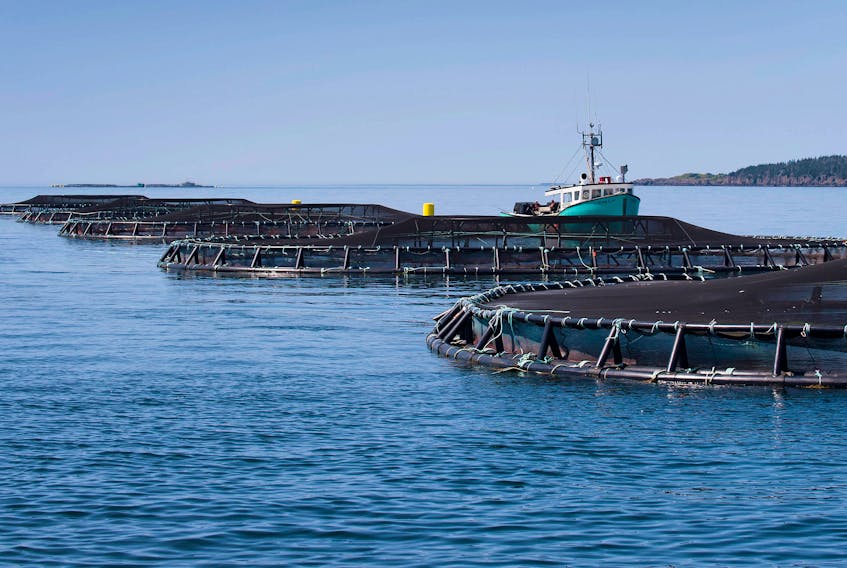Last Thursday, I stepped inside the Municipality of the District of Chester’s office and asked the woman behind the front desk to point me towards council chambers.
Up the stairs, she said. “It will be obvious.”
It was. A sign on the door said the room had capacity for 40, but, despite the looming winter storm, it was standing room only in there.
In the hallway outside, another dozen people milled about, hoping to hear the proceedings on a loudspeaker.
I was kicking myself for not getting there earlier: the last council meeting to discuss Cermaq Canada’s plans to expand its salmon farming operations into St. Margarets and Mahone bays was a real humdinger.
Eventually, things got so unruly that Warden Allen Webber had to declare the meeting out of order and shut the meeting down.
Last week, therefore, he kept a tighter rein on things: Only a few people got to ask questions of Bruce Hancock, director of aquaculture for the provincial Department of Fisheries and Aquaculture, and the Cermaq representatives.
But anyone could tell that the council members, and the people in the room — who, by my reckoning, included local residents, a few lobster fishermen, and some members of an anti-open net aquaculture organization called the Twin Bays Coalition -- had strong feelings on the subject.
At one point Vicki Savoie, Cermaq’s East Coast sustainable development director, flashed a slide showing the area within St. Margarets Bay in which the company had an option to apply to establish ocean-bound salmon pens.
A gasp rippled through the crowd. “Oh, my God,” said one person, while another added, “the whole bay.”
If there had been news cameras at the meeting the clip they would have chosen would have been Syd Dumaresq, a spokesman for the Twin Bays Coalition, saying “we adamantly believe that open net fish farms should not be in any bay in Nova Scotia,” along with the ensuing applause, and a hearty round of “here heres” from the audience.
When I talked with Dumaresq after the meeting, he said that most of the people he’s been in contact with support a ban on salmon farming in the waters along the South Shore — conceding, of course, that he was probably already talking to the converted.
“This,” he said of open-pen salmon farming, “is being foisted on an unwilling public by an insensitive and ill-informed provincial government.”
But it is a government that does seem to have a different take on the old jobs versus environment question.
For proof, one need look no further than Northern Pulp’s apparent belief that things were as they have always been in Nova Scotia. That anyone bringing jobs could make their own terms in dealing with our employment-hungry government.
Something was different this time.
When Premier Stephen McNeil announced that, as of Jan. 31, Northern Pulp could no longer dump contaminated waste water in Boat Harbour he surprised lots of people, including, apparently, the company, a subsidiary of Asia Pulp and Paper, an arm of the Indonesian conglomerate Sinar Mas.
It is their problem for not understanding that these are different, eco-friendlier times in this province, and that Nova Scotia is no longer the kind of compliant place that bows and scrapes to every potential employer.
“It’s a matter of trusting the process,” the premier told me Monday, referring to the way decisions like this are reached.
One thing doesn’t trump the other, he said.
“It’s a balancing act. You have to have economic development and you have to protect the environment.”
So, last year, we saw a member of one of the province’s major business families, Paul Sobey, denouncing a proposed gold mine in Guysborough County on some land that his family donated to the Nova Scotia Nature Trust as “mind-boggling,” in a way that is not meant as a compliment.
At around the same time, the project’s proponent, Atlantic Gold, came under fire after someone was manhandled at one of its public meetings, the video of which was shared widely on social media, eliciting a public outcry.
The Nova Scotia and federal governments, by the way, are both awaiting Atlantic Gold’s environmental assessment statement for the project, at which point, I boldly predict, the fur will fly.
Just look, if you will, at the public outcry over the possible sale of Owls Head -- 267 hectares of ecologically sensitive, coastal land located along the Eastern Shore — to a developer who might turn it into a trio of golf courses.
McNeil told me that, contrary to what has been said, Owls Head “was never a protected space” before negotiations between the province and Lighthouse Links Development Company began.
Furthermore, he pointed to Highlands Links Golf course, located within Cape Breton Highlands National Park, as proof that golf courses don’t necessarily destroy the surrounding landscape.
“We can’t just protect everything,” he said of Owls Head, adding, “We have to have jobs, particularly, in our rural areas.”
The balance thing once again. There are places in Nova Scotia where “aquaculture won’t be able to happen,” McNeil said, and places where it will.
Nova Scotia’s aquaculture regulations are as tough as they are anywhere he added, reiterating that “people just have to have faith in the process.”
As the aquaculture story plays out along the South Shore, we will see how much of that people really possess.









